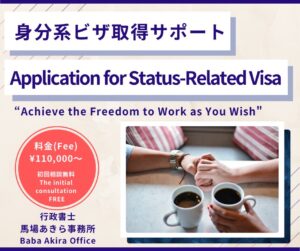"What Happens to the Residency Status of Spouses of Japanese Nationals? A Guide to Post-Divorce Procedures" Part 5
Post-Divorce Life Support and Available Resources
Topic: Services and Resources to Support Your Life in Japan After Divorce
Starting a new life in Japan after a divorce can be challenging, especially for foreigners who may face language and cultural barriers. However, Japan offers various resources and services to support post-divorce life. This article explores the available support and services to help you navigate this transition and build a stable life.
1. Essential Support for Life After Divorce
To overcome the challenges of post-divorce life, support in the following areas is crucial:
(1) Securing Housing
- If you need to leave your current residence after the divorce, finding new housing should be a priority.
- Available Resources:
- Municipal housing support offices (provide information on public and private housing).
- Real estate agencies and local housing information websites.
- Temporary housing support from NPOs or international exchange centers.
(2) Securing a Source of Income
- Stable employment or income is essential for a secure life after divorce.
- Available Resources:
- Hello Work (Public Employment Service): Offers job search support, including services for foreigners in some locations.
- Job listing websites and magazines for bilingual or Japanese-speaking individuals.
- Vocational training centers that provide skill-building courses and certification programs.
(3) Child Education and Parenting Support
- If you have children, you may need support for their education and care.
- Available Resources:
- School counseling services: Assist with transferring schools or Japanese language support for children.
- Municipal childcare support centers: Provide temporary childcare services and parenting advice.
- Organizations and groups offering parenting support specifically for foreign families.
2. Accessing Emotional Support
(1) Counseling Services
- Consider seeking counseling to cope with the stress and loneliness that can follow a divorce.
- Available Resources:
- Regional mental health and welfare centers: Offer free or low-cost counseling.
- Multilingual telephone helplines for foreigners.
- Online counseling services.
(2) Support Groups and Communities
- Connecting with others who have gone through similar experiences can provide emotional relief.
- Available Resources:
- Support groups for single mothers and fathers.
- Local international exchange events and workshops.
- Online forums and social media groups for sharing experiences and advice.
3. Language Learning and Cultural Adaptation Support
(1) Japanese Language Learning
- Learning Japanese can make job searching and daily life easier.
- Available Resources:
- Japanese classes organized by municipal offices (often free or low-cost).
- Language programs provided by NPOs and international exchange centers.
- Online language learning apps and websites.
(2) Information on Japanese Culture and Laws
- Understanding the laws and cultural norms in Japan is also important for a smooth transition.
- Available Resources:
- Guides for foreigners (available at municipal offices).
- Information provided by embassies or consulates.
- Seminars and workshops at local international exchange centers.
4. Financial Assistance Options
(1) Public Assistance Programs
- Japan has several programs to support individuals facing financial difficulties.
- Available Resources:
- Welfare Assistance: For those with unstable incomes (consult the municipal welfare office).
- Child Allowance: Provided to families raising children.
- Housing Security Benefit: Helps cover rent for those experiencing temporary income loss.
(2) Support from NPOs and Charities
- Some organizations provide food assistance and clothing for those in need.
- Available Resources:
- Food bank services.
- Essential goods provided by local support organizations.
5. List of Consultation Services
(1) Public Consultation Services
- Immigration Bureau Consultation Desk: Provides multilingual support on residency and legal matters.
- Municipal International Exchange Desks: Offer information on local life support services.
(2) Private Organization Consultation Services
- International Exchange Associations: Provide support and advice on living and legal issues for foreigners.
- Foreign Language Helplines: Some services offer 24-hour or multilingual support.
Conclusion
Post-divorce life can be challenging, but Japan has many resources to support foreign residents. From securing housing and income to accessing childcare and learning Japanese, taking advantage of these resources can help you start afresh. In the next article, we will explore "Common Divorce-Related Problems and How to Address Them."
